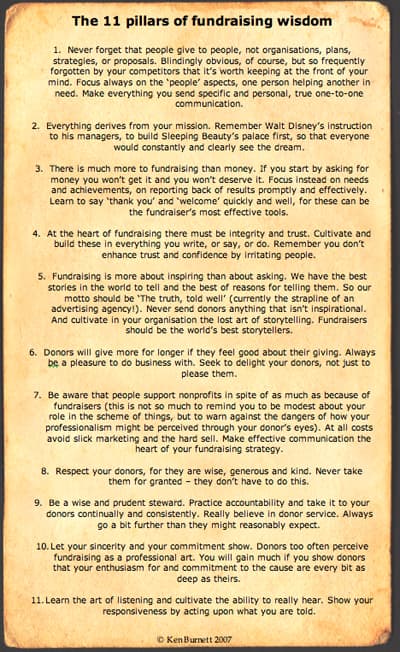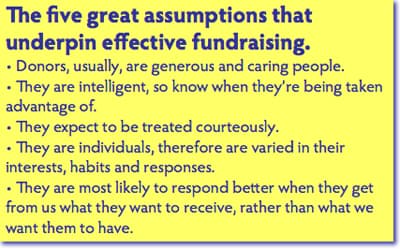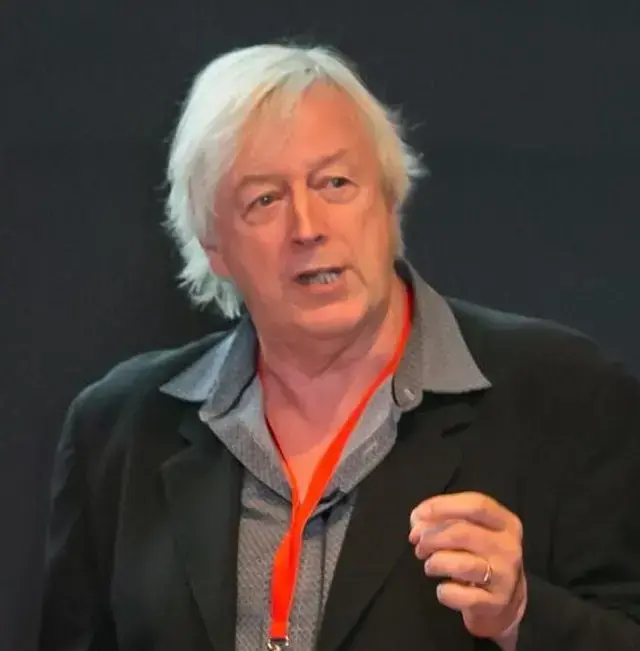The 11 pillars of fundraising wisdom – plus the five assumptions that underpin effective fundraising
In this noisy, brash and insincere world, how can fundraisers and their organisations stand out and be understood when much of the ground we would occupy is not our exclusive preserve? Indeed, our traditional territory tends to be crowded with other occupants who also posture, to the same audiences we wish to inspire, as ‘socially concerned’ and ‘worthwhile’, so we nonprofits have to struggle to be distinctive and different.
- Written by
- Ken Burnett
- Added
- June 26, 2008

Recent research showed that more than half of Britain’s top companies (the FTSE 100) use five or more words from a list of seven adjectives to describe themselves. These descriptors are integrity, honesty, value, promise, decency, caring and openness – all attributes to which we fundraisers would unquestionably aspire and might even assume are ours, by right.
The disgraced mega-corporation Enron had fantastic organisational values which clearly disarmed their publics, making them easier to sucker. Businesses like low-cost travel company Ryanair, on the other hand, have from the outset made it clear that they don’t give a damn about their customers; they just want to make maximum profit for themselves by offering lowest fares without frills.
Sharing the water with sharks like these, how should nonprofit enterprises conduct and position themselves? Perhaps by rethinking and representing our basic principles.

To help me in this I’ve turned to one of the great figures of the twentieth century, T E Lawrence, better known as Lawrence of Arabia. The title of his weighty but seminal work The Seven Pillars of Wisdom comes from the Bible, the Book of Proverbs, 9:1 no less, which says ‘Wisdom hath builded her house, she hath hewn out her seven pillars’. The ‘Seven Pillars of Wisdom’ referred to are, apparently, seven doctrinal categories that are the main supporting ‘pillars’ of almost every religious belief system in this world. It seems to me appropriate that when it comes to wisdom, fundraisers should have supporting pillars too, but should offer a bit more than did Mr Lawrence. So instead of seven I’ve gone for 11. Of course other than the title there is really very little to connect my 11 pillars with Lawrence’s. And though non-fundraisers may claim that Lawrence is concerned with more weighty issues than I, I trust fundraisers everywhere will appreciate that my ‘pillars’ are each at the very core of what matters to us and our profession.
Before I dispense with Lawrence it’s perhaps also worth reflecting on our somewhat different objectives as this gives me the chance to say just a little more about the great man and his tome. Lawrence’s plan was to write the definitive book on what were then perceived to be the seven great cities of Arabia. He wrote his original text in1919 while in Paris for the peace conference at the end of the Great War, finishing it later that summer, when back in Egypt. By December of that year he had a fair draft of most of the ten books that make up the Seven Pillars of Wisdom but, in an act of monumental absent-mindedness and misfortune, he lost it, or 85 per cent of it, when he misplaced his briefcase while changing trains at Reading railway station (you couldn’t make this up, could you?).
National newspapers alerted the public to the loss of the ‘hero's manuscript’, but to no avail: the draft remained lost. Lawrence refers to this version as ‘Text I’. Writing from memory he attempted to recreate the lost work (it’s this more than anything that has earned for the man my undying admiration). By the time he had finished ‘Text II’ it had become both longer and more of an autobiography. He then re-edited this for publication and destroyed his original manuscript (no backing up on an external hard drive for him).
Although as a youngster I found The Seven Pillars exceedingly heavy going, its abridged version at least had some enthusiastic followers. In a private letter to Britain’s Prime Minister Stanley Baldwin, George Bernard Shaw wrote of it: ‘The Work is a masterpiece, one of the few very best of its kind in the world.’
Obviously, I should have persevered with it.

In his brilliant book Revolution in the Mailbox (which tells fundraisers all they could ever want to know about raising money by direct mail) guru Mal Warwick ascribes to me the formulation of what he calls the five great assumptions that underpin effective fundraising. These are shown and explained opposite.
If we rigorously follow these assumptions then donors will give. And not just money. The six things we can ask our donors for are money (of course), time, goods, information, voice/influence and introductions.
These five assumptions considered in conjunction with the six things we can ask donors for are a great starting point, for armed with this knowledge it’s not hard to arrive at the 11 pillars of fundraising wisdom. They are illustrated opposite.
I suggest that you display these or a version of them prominently on your office wall. They will help people to understand you and to know what you stand for.
This article was first published in January 2007 in the US journal Contributions.
© Ken Burnett 2007


















